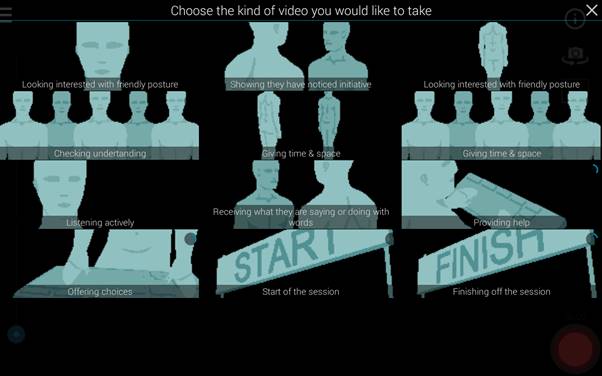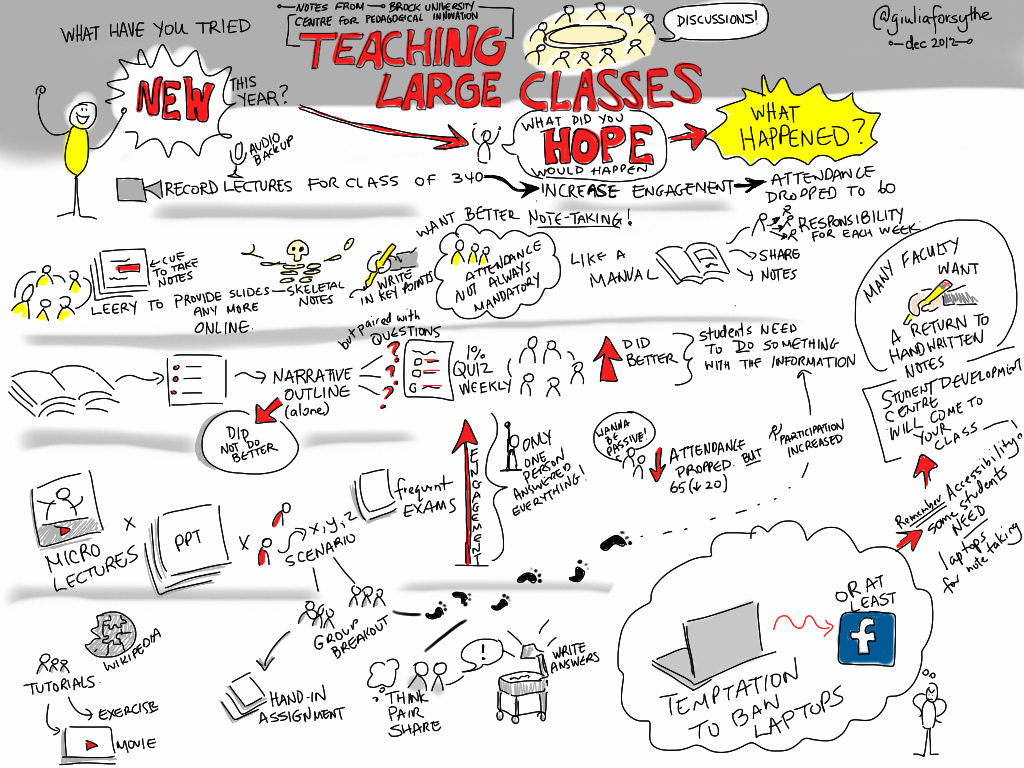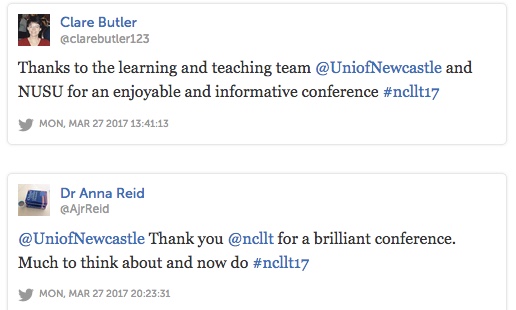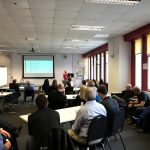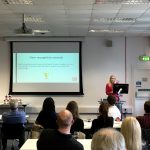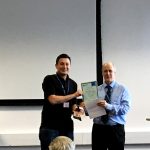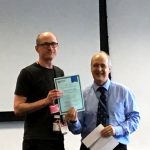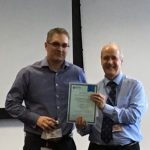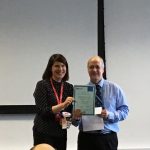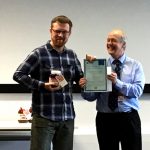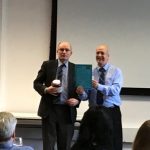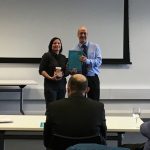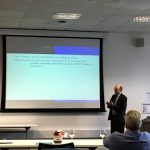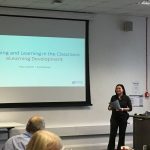UKCISA (The UK Council for International Student Affairs) is offering small grants for projects (£2,000) and research (up to £5,000) to support the international student experience. Continue reading “Funding Opportunity: UKCISA Supporting International Students”
Bootlegger, EventMovement and Open Lab
In our recent Pizza Pop and Practice event, Dr Ahmed Kharrufa and Dr Tom Bartindale from OpenLab let us loose on an app that Tom has been developing over the last few years called Bootlegger.
Bootlegger makes it easy to help people make videos together using mobile applications. One person creates a “Shoot” and invites others “the crew” to contribute. The Shoot contains a template with the set of shots required in the video. The crew sign into Bootlegger, join the shoot and then choose the shot to take from the template.
We used a template that Ahmed had offered to his students – one designed to help them capture feedback on Ahmed’s teaching. (A uniquely student centred view!)
Our film crew of 21 experimented and happily collected over 47 clips. Each person could then view all the clips in the shoot and curate a video by adding clips to a timeline.
Bootlegger made the process really easy and engaging.
You can find out more information about Bootlegger here:
- bootlegger.tv
- https://bootlegger.tv/howtobootleg
- The App can be downloaded from the Google Play and iTunes stores.
Ahmed also introduced us to how the Event Movement site https://eventmovement.co.uk/ site could be used to enable students to co-design teaching sessions.
Ideas in Event Movement move through stages Promote -> Get involved -> Plan it. Students were invited to contribute ideas for a teaching session, they could vote on the proposed topics and once the topic of the event was selected could get involved in co-designing the session – proposing and voting on different ideas. Ahmed’s slides from the session give further details.
To hear about future NUTELA events sign up to our mailing list.
Workshop: Exploring career development via teaching and learning
Workshop: Exploring career development via teaching and learning
3rd July 2017 – The Core
This one-day workshop is for all academic staff interested in developing their career on the basis of teaching.
This interactive day will involve: identifying activities that may lead to reward and recognition, reflections from successful colleagues both internally and externally, and developing action plans.
It will be a space to discuss approaches to building your career, gaining internal, or external, validation of excellence and to consider your individual development path.
See the programme of the day: programme_final
Places are limited. To attend please complete the booking form.
Next NUTELA event: Open Lab showcase
All are welcome to the final NUTELA 3Ps event (Pizza, Pop and Practice) of the academic year:
Show and TEL and Have a Go: Open Lab.
7th July 2017 Bamburgh Room – Kings Road Centre. 12:00- 14:00. Continue reading “Next NUTELA event: Open Lab showcase”
Learning and Teaching Conference 2017: Reimagining Teaching Excellence
In 2017 the Newcastle University annual Learning and Teaching Conference took place on 27 March 2017.
Conference theme: Reimagining Teaching Excellence
Newcastle’s commitment to excellent teaching is at the heart of our University mission, and is crucial to our aim of providing an educational experience that challenges and supports our students to fulfil their potential. At a time when external agencies are seeking to define this for us, it is more important than ever that we have a clear understanding of what we as an academic community understand by learninhe phrase ‘teaching excellence’.
Teaching excellence was therefore the focus of the 2017 Conference and the programme for the day provided an opportunity to:
- hear an external view point on teaching excellence from keynote speaker Paul Blackmore – Professor of Higher Education at The Policy Institute, King’s College London
- hear about what our staff and students view as teaching excellence
- see examples of teaching practice and innovation from across the institution
- contribute to how the University will pursue excellence in learning and teaching in the future through a session on the development of our new University Learning, Teaching and Student Experience Strategy.
Resources From The Day
Introduction Presentation from Professor Suzanne Cholerton
PowerPoint slides and ReCap recording
Keynote – Professor Paul Blackmore – Professor of Higher Education at The Policy Institute at King’s College London
PowerPoint slides and ReCap recording
Teaching Excellence at Newcastle
Newcastle Educators Group – Dr Vanessa Armstrong (Biomedical Sciences), Dr Sara Marsham (Marine Science & Technology) and Dr JC Penet (Modern Languages)
PowerPoint slides and ReCap recording
Teaching Excellence Awards (TEAs)
Chris Duddy (Education Officer, NUSU), David Jones (Assistant Development Officer, HaSS Faculty) and Joe Barton (Representation Support Worker, NUSU)
PowerPoint slides, ReCap recording and TEAs Report 2016
Development of Learning, Teaching and Student Experience Strategy
Facilitated by Craig Smith from Flint Spark Consulting.
PowerPoint slides and ReCap recording (audio only)
Herschel Learning Lab – experiences of use
Mrs Ulrike Thomas – Research Associate, Education Communication and Language Sciences) PowerPoint slides
Dr Ellen Tullo – Lecturer, Biomedical Sciences PowerPoint slides
Professor TT Arvind – Professor of Law, Newcastle Law School PowerPoint slides
Dr James Stanfield – Lecturer, Education Communication and Language Sciences Website
Miss Katie Wray – Lecturer, SAgE Faculty Office PowerPoint slides
Posters
View the list of poster presentations at the 2017 Learning and Teaching Conference, and view the posters online.
Student trade fair: come along to this a student, industry and academic event
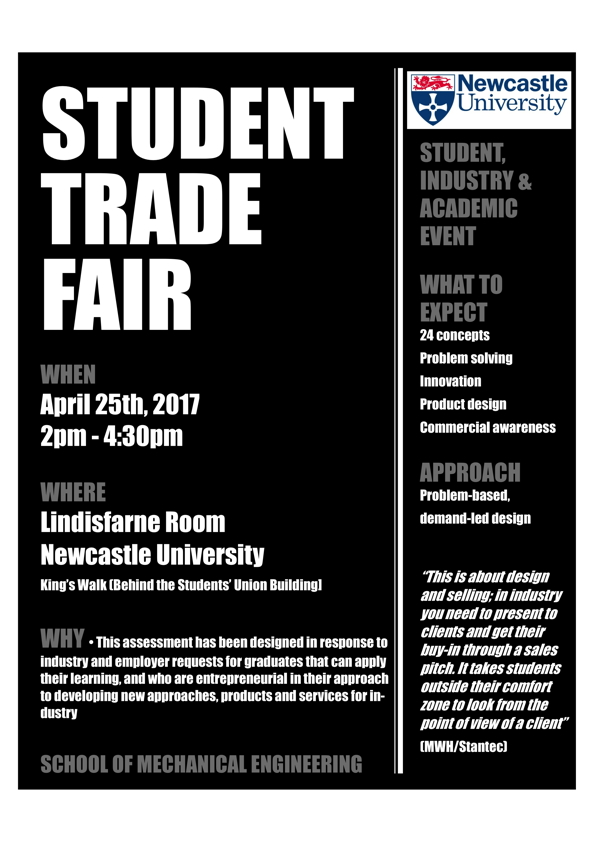
Anyone is welcome to come along to this exciting student trade fair.
- Designed in response to industry and employer requests for graduates that can apply their learning, and who are entrepreneurial in their approach to developing new approaches, products and services for industry.
- A chance for students to showcase their problem solving, innovation, product design and commercial awareness skills through problem-based, demand-led design.
This is about design and selling; in industry you need to present to clients and get their buy-in through a sales pitch. It takes students outside their comfort zone to look from the point of view of a client
(MWH/Stantec)
Mechanical Engineering Trade Fair
25 April 2017
2pm to 4.30pm
Lindisfarne Room
Kings Road Centre
There is another Trade Fair for Computing Science on 2 May:
Computing Science Trade Fair
2 May 2017
2pm to 4.30pm
Lindisfarne Room
Kings Road Centre
Feeling Connected: Working with large groups
-
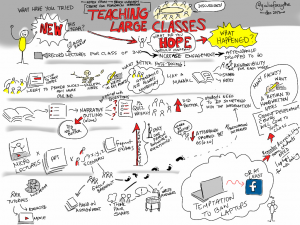
Teaching Large Classes Giulia Forsythe CC-BY-SA https://www.flickr.com/photos/gforsythe/8261536706 How can you engage large student cohorts in the classroom/lecture theatre?
- And how could you maintain those connections when the lecture is over?
- How do you make meaningful connections with all your students?
Aimed at academic and professional services staff these practical workshops draw on examples of effective practice from within the University and from outside. Ranging from using technology effectively, and utilising basic acting techniques, to creating accessible materials for everyone, we share ideas and tips you can take away and try with your large groups tomorrow.
You can attend all three, or choose the ones that best meet your needs
Creating connections: Managing large groups in the lecture theatre
Tuesday 9th May 12.00-14.00, G.07 Daysh Building
In this workshop we share tips and tricks for how we can effectively manage large groups in the lecture theatre, You’ll be able to try out some techniques for yourself in this interactive session, with case studies from colleagues from across the University and some practical exercises ranging from maintaining audience attention and using lecture theatre technology to how to stop your voice giving out as term progresses.
Staying connected: Facilitating large groups outside of the lecture theatre
Tuesday 19th September 12.00-14.00, Herschel Learning Lab, Herschel Building
The recent NUSU report on the Teaching Excellence Awards contained some gems of information from students, one of which was that they really value the activities before and after a lecture. But how do you build meaningful activities and maintain attention outside of the lecture theatre? This workshop looks at ‘the lecture sandwich’ where we share tips and get some hands on experience of using Blackboard, ReCap discussion boards etc to help build collaborative learning before and after the lecture. We also look at boundary setting and expectation management with email and in discussion boards.
Connecting everyone
Date tbc (pending timetabling)
Drawing on inclusive learning principles this cluster based hands on workshop focuses on learning for all and reaching everyone on your large group. We share tips on using multiple communication channels, and how using module handbooks, reading lists, well structured documents effectively can help get to hard to reach students.
Further information and bookings
For more information and to book: www.ncl.ac.uk/ltds/about/training/feelingconnected/
You can choose to come to all three or just pick the ones that best suit your needs. And bring a sandwich with you, if you like.
The Newcastle University Learning and Teaching Conference 2017
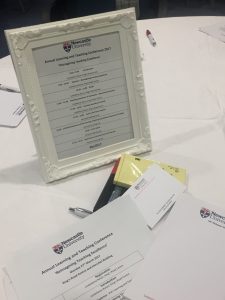 The annual Learning & Teaching Conference for staff at Newcastle University took place on Monday 27 March 2017. Celebrating learning and teaching at Newcastle University, it was organised by ourselves on behalf of the Pro Vice Chancellor for Learning and Teaching, Professor Suzanne Cholerton.
The annual Learning & Teaching Conference for staff at Newcastle University took place on Monday 27 March 2017. Celebrating learning and teaching at Newcastle University, it was organised by ourselves on behalf of the Pro Vice Chancellor for Learning and Teaching, Professor Suzanne Cholerton.
This year’s theme was Reimagining Teaching Excellence, and the day was spread over two venues: the Lindisfarne Room in the Kings Road Centre and the Herschel Learning Lab, with lunch and an engaging poster session in the foyer of the Herschel Building.
We started with a short introduction from Suzanne Cholerton who thanked everyone for their contributions to making the student learning experience and Newcastle’s teaching reputation so good, before introducing our keynote speaker, Professor Paul Blackmore from the Policy Institute, Kings College London.
Paul spoke eloquently about making curricular changes in higher education institutions and introduced us to examples from all over the world, including Melbourne Arizona State and Hong Kong Universities, whilst provoking questions about how such decisions are made, the associated risks, and how we know whether these interventions have been effective.
He went on to question Biggs’ ideas on constructive alignment, much quoted in educational development, and suggested these ideas were a good servant but a bad master for developing curricula. Asking what the real links are between research and teaching, he moved on to discuss the recent White Paper and the Teaching Excellence Framework (TEF).
He also covered themes around commodity, interdisciplinarity, globalisation and networks. Professor Blackmore’s keynote was well received and set the scene well for challenging what teaching excellence is, and for taking risks when thinking about changing the curriculum.
Next, Sara Marsham, JC Penet and Vanessa Armstrong took the stage to talk about teaching excellence and the Newcastle Educators peer educator network. In an interactive session they asked us to share ideas of what teaching excellence is or could be, and made the point that the concept is very culturally bound.
The last session of the morning had everyone scribbling notes furiously as representatives past and present from the Newcastle University Student Union (NUSU) talked about the analysis they had done on the NUSU Teaching Excellence Awards, highlighting some of the report‘s findings. Students at Newcastle value an eclectic mix of learning and teaching approaches including blended learning, flipped classroom, TEL, and collaborative approaches to learning.
Our students see learning as incremental, and appreciate the intellectual generosity of their lecturers, their knowledge and expertise. They like lectures to be a conversation, through use of open discussion and participation in the learning process. This creates an atmosphere where students feel enabled to contribute and speak up, as well as opportunities to talk to staff informally.
The report highlights that what happens before, during and after the lecture are all important. This really highlighted how much students are engaged in thinking about good teaching. They really don’t see academic time as an unlimited, on-demand service.
At lunch the poster session took place and the audience was asked to vote for their favourite posters.
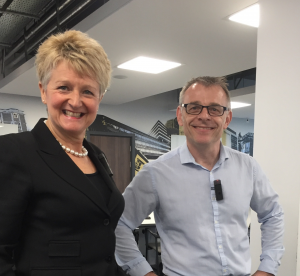
For the afternoon sessions we moved from the Lindisfarne Room to the Herschel Learning Lab. A session using the facilities in the Herschel Learning Lab was facilitated by Craig Smith, who looked at developing the Newcastle University Learning, Teaching and Student Experience Strategy. Attendees contributed their ideas about the key factors that the new strategy should include, collaborating in group and utilising the room’s technology.
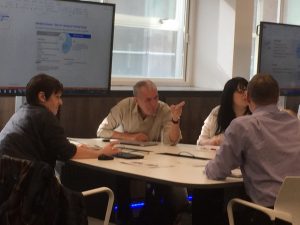 We attempted to use all of the affordances of the Herschel Learning Lab (HLL) in this highly engaging session (not least because of the omnipresence of Tina Turner!). Some colleagues who have successfully used the HLL then showed us how to use it properly.
We attempted to use all of the affordances of the Herschel Learning Lab (HLL) in this highly engaging session (not least because of the omnipresence of Tina Turner!). Some colleagues who have successfully used the HLL then showed us how to use it properly.
Ulrike Thomas, Ellen Tullo, TT Arvind, James Stanfield, and Katie Wray were all familiar with the space and outlined how they had successfully used it with some diverse cohorts over very different courses, from all three Faculties. Ulrike reminded us that we can look at learning spaces in the teaching room finder.
TT suggested that planning how you were going to use the technologies in the HLL was essential to success, and by using the affordances of the space, the barriers between teaching and learning could be broken.
Linear and block teaching, group meetings, workshops, society meetings all worked well in the space said Katie Wray, but group work, collaboration using activities, engagement and video all worked particularly well. What worked less well? More than 20 groups, lectern based lectures, and the inflexibility of the space all posed challenges.
The resources from the day are available from the LTDS website. Don’t forget you can find many examples of effective learning and teaching practice on the case studies database.
Please comment on this post, or email ltds@ncl.ac.uk to let us know how we can make next year even better!
NUTELA 4p’s – Peer Recognition Awards
The 2nd NUTELA Peer Recognition Awards took place on Friday. These awards are designed to recognise University staff who go above and beyond the call of duty to help their colleagues, schools and units to adopt forms of technology-enhanced learning (TEL).
Staff were asked to nominate someone who had helped them understand the purpose of a specific learning technology, or someone who has been instrumental in progressing TEL initiatives.
Congratulations to Jerry Hagon and Tracey Connell for winning the awards.
Both have both been integral to helping other staff to adopt innovative technologies in their teaching. The award was presented by Professor Philip Bradley, Chair of eLSI, and the winners will be invited to the Vice-Chancellor’s Celebrating Success event.
Full list of winners and nominees
Winner – Jerry Hagon – (School of Chemistry)
Winner – Tracey Connell – (FMS Graduate School)
Nominations:
- Anthony Stafford
- Graeme Tait
- Ruth Valentine
- Alex Inskip
- John Moss
- Nuala Davies*
- Graeme Redshaw-Boxwell*
- Marc Bennet*
* NUTELA Steering Group members are not eligible for prizes since they are involved in the judging process. However, some were nominated and they are recognised here.
NUTELA Peer Recognition Awards 2016/17
NUTELA’s annual Peer Recognition awards will be presented on Friday 24th March, 3-5pm, History Room, Students’ Union.
The awards recognise staff who go above and beyond the call of duty to help their colleagues, schools and units to adopt forms of technology-enhanced learning (TEL).
All are invited to join us to celebrate.
There will be pizza, pop and plonk and awards shall be presented by Professor Philip Bradley, Chair of eLSI (eLearning and Student Information Sub-Committee).
To register please complete the booking form.
NUTELA (Newcastle University’s Technology Enhanced Learning Advocates) are a peer network of colleagues who promote the use of technology in teaching. The group’s focus is on providing practical, practitioner-informed support. They meet termly at lunch time events to share practice over pizza and pop.
For more information please contact ltds@ncl.ac.uk

